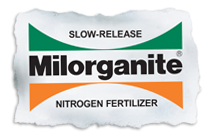How to Apply and Use Milorganite in Your Garden
- Milorganite AgronomistMay 28, 2022
Sometimes customers ask if they can use Milorganite to fertilize anything other than their lawn. The answer is, “Yes!” Most of our faithful customers know Milorganite as lawn fertilizer, but it can also be used throughout your entire yard, landscape and gardens.
One of the best features of Milorganite is that it’s virtually “goof-proof.” It won’t burn your lawn or anything else in your yard. This makes it an especially good fertilizer for those new to lawn, landscape, and garden care.
Milorganite feeds the soil, which feeds the plants.
When soil temperature and moisture levels are right, Milorganite is broken down by the thriving ecosystem in your soil and nutrients are then available to plants for up to 8 -10 weeks. Milorganite also adds organic matter to the soil, which helps to condition the soil and retain moisture.
How to Easily Measure Milorganite
Here’s a tip for how to easily measure smaller amounts of Milorganite. One pound of Milorganite equals approximately 3 cups. So you don’t have to keep a scale in your garage, use a container—a large yogurt container works well. Add one cup of Milorganite and mark that level. (I prefer marking the inside of the container.) Do the same thing after adding the second and third cup of Milorganite. Now you have a 3-cup measure for a pound of Milorganite.
Below I’ll share the basic information you need for how to use Milorganite to fertilize your vegetable and flower gardens; including when to apply Milorganite, how much Milorganite to apply (rate), how to apply it, as well as several tips.
Milorganite offers an Application Guidelines.pdf you can print and hang in your garage or shed as a reference throughout the year.
Milorganite in Your Vegetable Garden
When to Apply Milorganite on Your Vegetables
Milorganite is non-burning, so it won’t harm seedlings or young plants. Milorganite complies with the most stringent safety requirements and can be used safely in your edible garden when used as directed.
- Milorganite can be applied or re-applied anytime during the growing season. It’s easiest when Milorganite is worked into the soil in an empty vegetable garden before planting seeds or plants.
- 4.5 lbs (13 1/2 cups) Milorganite per 50 sq ft of garden. (one pound of Milorganite = about 3 cups)
How to Apply Milorganite to Your Vegetable Garden
- If you’re fertilizing before planting, evenly distribute Milorganite and rototill or hoe into the soil to the rooting depth of the plants you intend to plant or seed.
- If you’re fertilizing after planting, apply ½ cup of Milorganite around each plant and gently work it into the soil.
- For a mid-season boost, apply ½ cup of Milorganite per plant and gently work it into the soil without disturbing the roots or add 4.5 lbs (13 ½ cups) Milorganite per 50 sq ft and gently work into the soil between plants.
Vegetable Gardens Tips
- For additional information on using Milorganite in your vegetable garden, check out Abundant Vegetables: Harvest Starts Now!
- Here are Vegetable Application Rates.
- Flavorful Vegetables in Five Steps includes gardening tips from horticulturist and gardening expert Melinda Myers.
When to Apply Milorganite to Annual and Perennial Flower Gardens
Flowers are heavy feeders and require fertilization during the growing season to keep them in top form. Milorganite feeds flowers for 6–8 weeks. If you’re planning your first annual or perennial flower garden, we’ve provided some questions to consider, as well as additional information on how to prepare and maintain flower beds.
- Annuals: Before you plant in spring and again mid-summer.
- Perennials: Early spring when plants begin to emerge and again after the plants bloom, which strengthens them for the following growing season.

How Much Milorganite to Use for Annual Flowers
- Spring: Prior to planting, work in 1½ lbs (4 ½ cups) of Milorganite for every 50 sq ft.
- Mid-summer: Apply 1 lb (3 cups) of Milorganite for every 50 sq ft and gently work it into the soil for a mid-season boost.
How Much Milorganite to Use for Perennial Flowers
- Prior to planting: Apply 2½ lbs (7½ cups) of Milorganite for every 50 sq ft.
- Spring: When plants begin to emerge, gently work in 2½ lbs (7½ cups) of Milorganite for every 50 sq ft.
- Mid-summer: After flowers bloom, gently work in 2 ½ lbs (7½ cups) of Milorganite to strengthen plants for the following year.
How to Apply Milorganite to Flowers Gardens
- Distribute Milorganite by hand and work gently into the soil without disturbing the plants’ roots using the 3 cups (1 lb.) measure you made.
Tips for Flower Gardens
- Break up any clods of soil, till or work the soil by hand.
- For annuals, loosen soil to a depth of 2–3” below rooting depth. For perennials, till to a depth of 6” below rooting depth.
- Mulch around plants to keep roots cool and help prevent water from evaporating during the summer heat, as well as help to control weeds.
- At the top of the Flower Application Rates page, you’ll find links to information specific to roses and daylilies, how to divide perennials, planting bulbs, and container gardening.
- Use slow-release Milorganite fertilizer. It steadily feeds the plants for 6 – 8 weeks.

